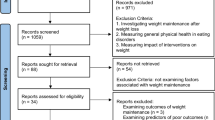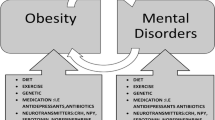Abstract
Background
Although bariatric surgery is an established treatment for obesity, less is known regarding the long-term effects of surgery on psychiatric function. This paper reports changes in psychiatric treatment status, weight, and weight-related comorbidities over 5 years of follow-up among a population of veterans completing bariatric surgery.
Methods
We assessed 55 veterans undergoing bariatric surgery at a single Veteran Affairs medical center for 5 years post-surgery. Patients completed a pre-surgery clinical interview with a licensed psychologist. Using computerized medical records, we tracked pre- to post-surgery involvement with antidepressants, anxiolytics, psychotherapies, and overall psychiatric treatment visits along with changes in weight and metabolic function.
Results
Rates of antidepressant use and/or involvement with psychotherapy for depression declined from 56.4 % at pre-surgery to 34.6 % at 5 years post-surgery, p = 0.01. Anxiolytic use and/or involvement with psychotherapy for anxiety, however, increased from 23.6 to 32.7 % pre- to 5 years post-surgery. Average psychiatric treatment volume remained similar to pre-surgery status across follow-up. These mixed indicators of psychiatric improvement occurred despite marked metabolic improvements from surgery. Mean percent excess weight loss = 51.7 and 41.3 (1 and 5 years post-surgery, respectively), systolic blood pressure (−6.8 mmHg (14.3)/−6.1 mmHg (12.8), respectively), glucose levels (−18.6 mg/dL (30.2)/−10.0 mg/dL (25.9), respectively), triglycerides (−78.2 mg/dL (96.7)/−69.1 mg/dL (102.2), respectively) and high-density lipoproteins (+7.1 (9.9)/+11.3 (11.3), respectively) levels each improved.
Conclusions
We report evidence of decreased antidepressant use and depression therapies following bariatric surgery, but no improvements on rates of anxiolytic use and anxiety therapies or on overall psychiatric treatment involvement. Despite metabolic improvements, bariatric patients with psychiatric histories may warrant ongoing attention to mental health.

Similar content being viewed by others
References
Pontiroli AE, Morabito A. Long-term prevention of mortality in morbid obesity through bariatric surgery. A systematic review and meta-analysis of trials performed with gastric banding and gastric bypass. Ann Surg. 2011;253:484–7.
Padwal R, Klarenbach S, Wiebe N, et al. Bariatric surgery: a systematic review and network meta-analysis of randomized trials. Obes Rev. 2011;12:602–21.
Sjöström L, Narbro K, Sjöström CD, et al. Effects of bariatric surgery on mortality in Swedish obese subjects. N Engl J Med. 2007;357:741–52.
Leblanc ES, O’Connor E, Whitlock EP, et al. Effectiveness of primary care-relevant treatments for obesity in adults: a systematic evidence review for the U.S. Preventive Services Task Force. Ann Intern Med. 2011;155:434–47.
Shaw K, O’Rourke P, Del Mar C, et al. Psychological interventions for overweight or obesity. Cochrane Database Syst Rev. 2005;2:CD003818.
Tian HL, Tian JH, Yang KH, et al. The effects of laparoscopic vs. open gastric bypass for morbid obesity: a systematic review and meta-analysis of randomized controlled trials. Obes Rev. 2011;12:254–60. doi:10.1111/j.1467-789X.2010.00757.x.
Dixon JB, Murphy DK, Segel JE, Finkelstein EA. Impact of laparoscopic adjustable gastric banding on type 2 diabetes. Obes Rev. 2011. doi:10.1111/j.1467-789X.2011.00928.x.
Gill RS, Birch DW, Shi X, et al. Sleeve gastrectomy and type 2 diabetes mellitus: a systematic review. Surg Obes Relat Dis. 2010;6:707–13.
Poirier P, Cornier MA, Mazzone T, et al. Bariatric surgery and cardiovascular risk factors: a scientific statement from the American Heart Association. Circulation. 2011;19(123):1683–701.
Batsis JA, Romero-Corral A, Collazo-Clavell ML, et al. Effect of bariatric surgery on the metabolic syndrome: a population-based, long-term controlled study. Mayo Clin Proc. 2008;83:897–907.
Kalarchian MA, Marcus MD, Levine MD, et al. Psychiatric disorders among bariatric surgery candidates: relationship to obesity and functional health status. Am J Psychiatry. 2007;164:328–34.
Muhlhans B, Horbach T, de Zwaan M. Psychiatric disorders in bariatric surgery candidates: a review of the literature and results of a German prebariatric surgery sample. Gen Hosp Psychiatry. 2009;31:414–21.
Herpertz S, Kielmann R, Wolf AM, et al. Does obesity surgery improve psychosocial functioning? A systematic review. Int J Obes Relat Metab Disord. 2003;27:1300–14.
van Hout GC, Boekestein P, Fortuin FA, et al. Psychosocial functioning following bariatric surgery. Obes Surg. 2006;16:787–94.
Schowalter M, Benecke A, Lager C, et al. Changes in depression following gastric banding: a 5- to 7-year prospective study. Obes Surg. 2008;18:314–20.
de Zwaan M, Enderle J, Wagner S, et al. Anxiety and depression in bariatric surgery patients: a prospective, follow-up study using structured clinical interviews. J Affect Disord. 2011;133:61–8.
Cunningham JL, Merrell CC, Sarr M, Somers KJ, McAlpine D, Reese M, et al. Investigation of antidepressant medication usage after bariatric surgery. Obes Surg. 2012;22(4):530–5.
Hayden MJ, Dixon JB, Dixon ME, et al. Characterization of the improvement in depressive symptoms following bariatric surgery. Obes Surg. 2011;21:328–35.
Lier HO, Biringer E, Hove O, et al. Quality of life among patients undergoing bariatric surgery: associations with mental health—a 1 year follow-up study of bariatric surgery patients. Health Qual Life Outcomes. 2011;9:79.
Segal JB, Clark JM, Shore AD, et al. Prompt reduction in use of medications for comorbid conditions after bariatric surgery. Obes Surg. 2009;19:1646–56.
Jordan BK, Schlenger WE, Hough R, et al. Lifetime and current prevalence of specific psychiatric disorders among Vietnam veterans and controls. Arch Gen Psychiatry. 1991;48:207–15.
Karlsson J, Taft C, Rydén A, et al. Ten-year trends in health-related quality of life after surgical and conventional treatment for severe obesity: the SOS intervention study. Int J Obesity. 2007;31:1248–61.
Legenbauer T, Petrak F, de Zwaan M, et al. Influence of depressive and eating disorders on short- and long-term course of weight after surgical and nonsurgical weight loss treatment. Compr Psychiatry. 2011;52:301–11.
Assimakopoulos K, Karaivazoglou K, Panayiotopoulos S, et al. Bariatric surgery is associated with reduced depressive symptoms and better sexual function in obese female patients: a one-year follow-up study. Obes Surg. 2011;21:362–6.
Ertelt TW, Mitchell JE, Lancaster K, et al. Alcohol abuse and dependence before and after bariatric surgery: a review of the literature and report of a new data set. Surg Obes Relat Dis. 2008;4:647–50.
Suzuki J, Haimovici F, Chang G. Alcohol use disorders after bariatric surgery. Obes Surg. 2012;22(2):201–7.
Rutledge T, Adler S, Friedman R. A prospective assessment of psychosocial factors among bariatric versus non-bariatric surgery candidates. Obes Surg. 2011;21:1570–9. doi:10.1007/s11695-010-0287-8.
Nelson KM, Starkebaum GA, Reiber GE. Veterans using and uninsured veterans not using Veterans Affairs (VA) health care. Public Health Rep. 2007;122:93–100.
Mitchell JE, Steffen KJ, de Zwaan M, et al. Congruence between clinical and research-based psychiatric assessment in bariatric surgical candidates. Surg Obes Relat Dis. 2010;6:628–34.
Conflict of Interest
No grant support was employed in the completion of this study.
Author information
Authors and Affiliations
Corresponding author
Rights and permissions
About this article
Cite this article
Rutledge, T., Braden, A.L., Woods, G. et al. Five-Year Changes in Psychiatric Treatment Status and Weight-Related Comorbidities Following Bariatric Surgery in a Veteran Population. OBES SURG 22, 1734–1741 (2012). https://doi.org/10.1007/s11695-012-0722-0
Published:
Issue Date:
DOI: https://doi.org/10.1007/s11695-012-0722-0




